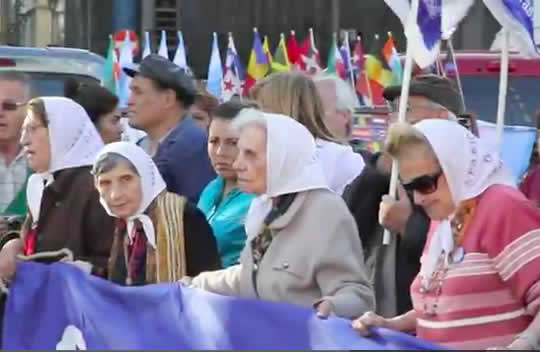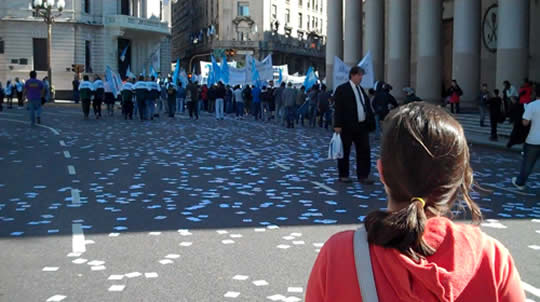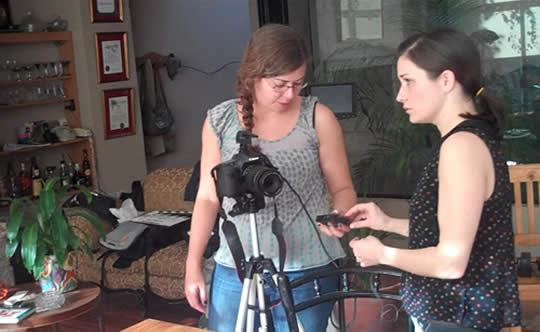 Finding Mabel is a gripping documentary that follows a young woman’s journey to Argentina, to piece together the enigmatic disappearance of the woman she was named after, one of the 30,000 people who disappeared during Argentina’s last military dictatorship. Part scavenger hunt, part self-discovery, Finding Mabel intelligently weaves Argentina’s recent dark past with today’s polarizing struggle for justice.
Finding Mabel is a gripping documentary that follows a young woman’s journey to Argentina, to piece together the enigmatic disappearance of the woman she was named after, one of the 30,000 people who disappeared during Argentina’s last military dictatorship. Part scavenger hunt, part self-discovery, Finding Mabel intelligently weaves Argentina’s recent dark past with today’s polarizing struggle for justice.
Eileen Reardon is a first generation Argentine American who holds a BA in Philosophy from UCLA, and an MFA from The New School for Drama in New York. She is a proud life member of The Actors Studio (LA & NYC) and was inducted into membership in 2007 upon invitation by co-presidents Ellen Burstyn, Harvey Keitel, & Al Pacino, following her audition. She is also a proud member of SAG/AFTRA, The Screen Actors Guild/American Federation for Television and Radio Artists. Finding Mabel marks Eileen’s directorial film debut. Eileen’s parents left Argentina in political exile during the military dictatorship (1976-1983), and raised her in the San Francisco bay area, where they have made great contributions towards social justice and social change, through their political work, and have inspired Eileen to do the same in her own way. Eileen’s intention is to use this film as an opportunity to reveal, educate, and to honor the memory of the 30,000 Disappeared.
Bijan Tehrani: Tell me about your connection to Argentina.
Eileen Reardon: My parents are both from Argentina, they were born and raised in Argentina and they were students in1976 when the coup happened. They met in Cordoba, at a demonstration–. Both of my parents had the same vision, along with many of their peers, of a fairer world and a fairer Argentina, just going out into the poor neighborhoods and fighting to bridge the gap between the poor and the privileged and that was a big part of what their fight was for. There were people who were very involved and there were people, who had similar  ideologies but were not as actively involved, but the military grouped them all and called them all terrorists and ‘subversive’. In 1976, some of their closest friends began to disappearing. One of them was a 19 year old woman by the name of Yolanda Mabel Damora and she was abducted from her house in the middle of the night. It was a very dangerous time for my parents at that time–the military was looking for them as well. My mom and my dad then fled to the US because my dad has family there. They risked their lives by leaving, they risked their lives by staying. When I was born in the US in 1980 my parents decided to give me my middle name which is Mabel as a tribute to this woman who fought and lost her life for her political ideology and her struggles and not until recently did I really understand the magnitude of what that meant and I am really starting to understand that now. I’m here now in Argentina with my crew, and we are shooting this documentary to help reconstruct the life of this woman and try to understand what it was that she was fighting for and what her hopes and dreams were so that in some way we can bring her voice to life. We have been talking a lot about not focusing on the death and rather focusing on the life that she lived and try to understand her life and not so much what happened after.
ideologies but were not as actively involved, but the military grouped them all and called them all terrorists and ‘subversive’. In 1976, some of their closest friends began to disappearing. One of them was a 19 year old woman by the name of Yolanda Mabel Damora and she was abducted from her house in the middle of the night. It was a very dangerous time for my parents at that time–the military was looking for them as well. My mom and my dad then fled to the US because my dad has family there. They risked their lives by leaving, they risked their lives by staying. When I was born in the US in 1980 my parents decided to give me my middle name which is Mabel as a tribute to this woman who fought and lost her life for her political ideology and her struggles and not until recently did I really understand the magnitude of what that meant and I am really starting to understand that now. I’m here now in Argentina with my crew, and we are shooting this documentary to help reconstruct the life of this woman and try to understand what it was that she was fighting for and what her hopes and dreams were so that in some way we can bring her voice to life. We have been talking a lot about not focusing on the death and rather focusing on the life that she lived and try to understand her life and not so much what happened after.
BT: Understanding the changing political climate of Argentina, how challenging is the work that you are doing now?
ER: There is always a sort of undercurrent of uncertainty here, but as you said that climate is changing and there has been a lot of progress made. With the kind of conversations that we are initiating here, maybe we have been really fortunate in our research and getting in touch with the right people, everyone that we talk to has been so generous. There have been a lot of challenges, don’t get me wrong, but we have been here for a little over a week and its almost as if one interview leads to another interview and you meet another person that we did not even know about and they are gracious enough to grant us an interview and we are collecting these amazing stories and we feel that we are supported by the current administration in terms of the truth that we are seeking to find being consistent with the political climate that is happening now, they are supporting the trials and supporting the struggle for justice; so in that sense it has not been as challenging as say right after the impunity laws were reversed. So it is a great time to be telling the stories about some of those challenges, but there are other challenges.
 BT: How has the progress been in the short time that you have been there?
BT: How has the progress been in the short time that you have been there?
ER: We’ve made tremendous progress, like I’ve said we have been getting amazing interviews and some really amazing doors have been opened for us perhaps that we did not necessarily know. I think we have made great progress especially in terms of reconstructing the history and the political evolution of things pre, during, and even after the repression. I think that is helping contextualize for us and for our audience everything that happened politically. In terms of the progress we have made with finding the woman, Mabel, after whom I was named. We haven’t really gotten there yet because we actually have to travel to Cordoba where she was from and where she was kidnapped and held in detention. You have to understand that when I say “Find her”, I am speaking metaphorically. There is a horrendous collective experience shared among The Disappeared and in most cases that experience ended in death. It is naive, I think, to speak of “finding Mabel” in a literal sense, because it perpetuates the thought that they are alive and well, living in Europe somewhere, in exile. That is not the case for most of the disappeared. So, when I say “I’m going to Cordoba in hopes of Finding Mabel”, I mean that I want to find out about her, and bring her story to light.
BT: How long do you plan to work there; do you know how long it will take the crew to finish the film?
ER: We are scheduled to be here in Argentina till just the middle of June, so the entire trip is about six weeks long, there is a lot of coordinating but again a lot the interviews that we have had have been a function of just being here and being available. So it is a six-week shoot essentially.
BT: Are you also having a kind of a screenplay in mind before you start or are you building the story as I goes along?
ER: We have a definite blueprint, but I sort of had this feeling going into it and its been proving itself to us the way it goes is that you have to have a blueprint because you have to have certain stories and plot points along the line, you can’t tell this story without explaining these things, context and history and the major players, you have to be able to reference those people in an interesting way so those are definitely on our storyboard. I think it is intrinsic to this type of movie and story that you don’t come here thinking that you know all the answers and facts. I wanted this to be a journey that I learn along the way with the audience. So there is a blueprint but there is also a lot up to surprise and up to fate.
BT: Did you find any material left over from the past, like newsreels or documents?
ER: Yes Absolutely, we were fortunate enough to have some amazing appointments, the NAVY MECHANICS SCHOOL (ESMA) which used to function as a clandestine detention center, now has a whole collection of archival materials and photos and we spent hours just sitting in their offices and viewing their material, so I think that this will really help to visually tell the story as well; so absolutely there is going to be a lot of that so without that it would not be the same film, so we are really grateful to the ‘Archivo de La Memoria’ for sharing their archives with us.
BT: Do you know of any other documentary made about this issue before?
ER: Yes there are, there are quite a few documentaries, there is almost its own genre. There are a couple of documentary films about the disappeared by American filmmakers that I have seen in recent years, they are both really good films, one is called “The Disappeared” and it is by Peter Sander and the other film is called “Our Disappeared” by Juan Mandelbaum. I watched these films and they definitely inspired me. Each filmmaker comes from her/her own perspective and that has helped us with this film. I also watched an Argentinean film; one of the most iconic Argentine docs made about the era, which is called ‘Los Rubios.’ I am hoping to follow the legacy of these other great filmmakers who have made films on the subject and take it in a different direction. Our film is being made 6,7,8, years later so every years that goes by there is more that one can add to this story; so yes, we watched a lot of films as research and also as inspiration.
BT: I think it is important to see those films as a filmmaker for you because you will try to look at the angles that have not been addressed in most of those films.
ER: Absolutely, first and foremost you want to tell a story that has not been told already, you don’t want to tell the same story again and again– but one story can be told 100 times 100 different ways. I completely agree with you our goal is to try and come from a slightly different perspective–one of a totally different generation. Again we are the generation of the children of the disappeared and also I am coming from a different perspective because my parents were fortunate enough to have left and if it was not for that I would not be here today so I feel a certain level of commitment and responsibility to tell their story. For better or for worse, coming into Argentina as a foreigner as somebody from the outside which is what I am in a lot of ways you are going to naturally have a different perspective, it is a story that is not told in the US but I think hopefully being a filmmaker from the US will lend itself to American audience because they are connected and they should be expressed and shared.
BT: I think another important part of your story is that people in other parts of the world are not aware of this story but through your film they will become aware.
ER: Yes, we were just talking about this yesterday, this was not just this moment that has come and gone, it had a beginning, it started somewhere else, it was influenced by other powers and other people and it does not end in 1983 when democracy, quote on quote, was restored in Argentina. The same tactics that were used in the detention centers in Argentina and the concentration camps are still being used today, in other parts of the world, and that connection needs to be made. In our film, we are passionate about connecting those dots for people who are not connecting them themselves.
BT: When do you think you begin the post work on the film, will you do this in the US?
ER: We are doing the transcribing and translating here, we have a wonderful translator here that is working every day and we are currently hosting a fundraising campaign that will enable us to jump right in into post production when we get back. We have a wonderful editor in Los Angeles named Meredith Young who is waiting patiently for us to arrive back in the US and she will be editing the film with the funds that we are raising on indie-gogo. Our indie-go-go campaign is Indiegogo.com/finishingfindingmabel, to finish the film in post-production. So our plan when returning on June 15th is to jump right in to the editing process, which will be a lengthy process we have a lot of material, but we want to just keep the workflow going we are in a great place and there is a lot of great dialogue to have and happening and ideally we will have the cut by the end of the year.
To help the filmmakers to finish this film, please click here.
